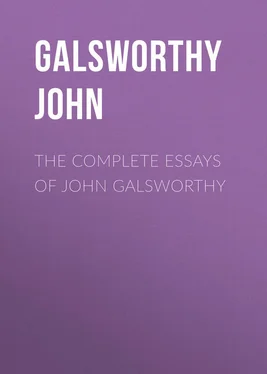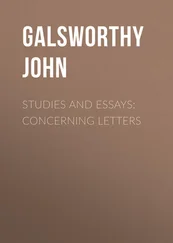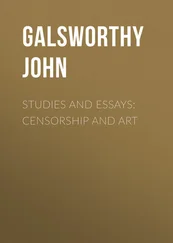John Galsworthy - The Complete Essays of John Galsworthy
Здесь есть возможность читать онлайн «John Galsworthy - The Complete Essays of John Galsworthy» — ознакомительный отрывок электронной книги совершенно бесплатно, а после прочтения отрывка купить полную версию. В некоторых случаях можно слушать аудио, скачать через торрент в формате fb2 и присутствует краткое содержание. Жанр: foreign_antique, foreign_prose, на английском языке. Описание произведения, (предисловие) а так же отзывы посетителей доступны на портале библиотеки ЛибКат.
- Название:The Complete Essays of John Galsworthy
- Автор:
- Жанр:
- Год:неизвестен
- ISBN:нет данных
- Рейтинг книги:5 / 5. Голосов: 1
-
Избранное:Добавить в избранное
- Отзывы:
-
Ваша оценка:
- 100
- 1
- 2
- 3
- 4
- 5
The Complete Essays of John Galsworthy: краткое содержание, описание и аннотация
Предлагаем к чтению аннотацию, описание, краткое содержание или предисловие (зависит от того, что написал сам автор книги «The Complete Essays of John Galsworthy»). Если вы не нашли необходимую информацию о книге — напишите в комментариях, мы постараемся отыскать её.
The Complete Essays of John Galsworthy — читать онлайн ознакомительный отрывок
Ниже представлен текст книги, разбитый по страницам. Система сохранения места последней прочитанной страницы, позволяет с удобством читать онлайн бесплатно книгу «The Complete Essays of John Galsworthy», без необходимости каждый раз заново искать на чём Вы остановились. Поставьте закладку, и сможете в любой момент перейти на страницу, на которой закончили чтение.
Интервал:
Закладка:
For an hour the pageant wound through the dejected street, pursuing neither method nor set route, till it came to a deserted slag-heap, selected for the speech-making. Slowly the motley regiment swung into that grim amphitheatre under the pale sunshine; and, as I watched, a strange fancy visited my brain. I seemed to see over every ragged head of those marching women a little yellow flame, a thin, flickering gleam, spiring upward and blown back by the wind. A trick of the sunlight, maybe? Or was it that the life in their hearts, the inextinguishable breath of happiness, had for a moment escaped prison, and was fluttering at the pleasure of the breeze?
Silent now, just enjoying the sound of the words thrown down to them, they stood, unimaginably patient, with that happiness of they knew not what gilding the air above them between the patchwork ribands of their poor flags. If they could not tell very much why they had come, nor believe very much that they would gain anything by coming; if their demonstration did not mean to the world quite all that oratory would have them think; if they themselves were but the poorest, humblest, least learned women in the land – for all that, it seemed to me that in those tattered, wistful figures, so still, so trustful, I was looking on such beauty as I had never beheld. All the elaborated glory of things made, the perfected dreams of aesthetes, the embroideries of romance, seemed as nothing beside this sudden vision of the wild goodness native in humble hearts.
1910.
A CHRISTIAN
One day that summer, I came away from a luncheon in company of an old College chum. Always exciting to meet those one hasn’t seen for years; and as we walked across the Park together I kept looking at him askance. He had altered a good deal. Lean he always was, but now very lean, and so upright that his parson’s coat was overhung by the back of his long and narrow head, with its dark grizzled hair, which thought had not yet loosened on his forehead. His clean-shorn face, so thin and oblong, was remarkable only for the eyes: dark-browed and lashed, and coloured like bright steel, they had a fixity in them, a sort of absence, on one couldn’t tell what business. They made me think of torture. And his mouth always gently smiling, as if its pinched curly sweetness had been commanded, was the mouth of a man crucified – yes, crucified!
Tramping silently over the parched grass, I felt that if we talked, we must infallibly disagree; his straight-up, narrow forehead so suggested a nature divided within itself into compartments of iron.
It was hot that day, and we rested presently beside the Serpentine. On its bright waters were the usual young men, sculling themselves to and fro with their usual sad energy, the usual promenaders loitering and watching them, the usual dog that swam when it did not bark, and barked when it did not swim; and my friend sat smiling, twisting between his thin fingers the little gold cross on his silk vest.
Then all of a sudden we did begin to talk; and not of those matters of which the well-bred naturally converse – the habits of the rarer kinds of ducks, and the careers of our College friends, but of something never mentioned in polite society.
At lunch our hostess had told me the sad story of an unhappy marriage, and I had itched spiritually to find out what my friend, who seemed so far away from me, felt about such things. And now I determined to find out.
“Tell me,” I asked him, “which do you consider most important – the letter or the spirit of Christ’s teachings?”
“My dear fellow,” he answered gently, “what a question! How can you separate them?”
“Well, is it not the essence of His doctrine that the spirit is all important, and the forms of little value? Does not that run through all the Sermon on the Mount?”
“Certainly.”
“If, then,” I said, “Christ’s teaching is concerned with the spirit, do you consider that Christians are justified in holding others bound by formal rules of conduct, without reference to what is passing in their spirits?”
“If it is for their good.”
“What enables you to decide what is for their good?”
“Surely, we are told.”
“Not to judge, that ye be not judged.”
“Oh! but we do not, ourselves, judge; we are but impersonal ministers of the rules of God.”
“Ah! Do general rules of conduct take account of the variations of the individual spirit?”
He looked at me hard, as if he began to scent heresy.
“You had better explain yourself more fully,” he said. “I really don’t follow.”
“Well, let us take a concrete instance. We know Christ’s saying of the married that they are one flesh! But we know also that there are wives who continue to live the married life with dreadful feelings of spiritual revolt wives who have found out that, in spite of all their efforts, they have no spiritual affinity with their husbands. Is that in accordance with the spirit of Christ’s teaching, or is it not?”
“We are told – ” he began.
“I have admitted the definite commandment: ‘They twain shall be one flesh.’ There could not be, seemingly, any more rigid law laid down; how do you reconcile it with the essence of Christ’s teaching? Frankly, I want to know: Is there or is there not a spiritual coherence in Christianity, or is it only a gathering of laws and precepts, with no inherent connected spiritual philosophy?”
“Of course,” he said, in his long-suffering voice, “we don’t look at things like that – for us there is no questioning.”
“But how do you reconcile such marriages as I speak of, with the spirit of Christ’s teaching? I think you ought to answer me.”
“Oh! I can, perfectly,” he answered; “the reconciliation is through suffering. What a poor woman in such a case must suffer makes for the salvation of her spirit. That is the spiritual fulfilment, and in such a case the justification of the law.”
“So then,” I said, “sacrifice or suffering is the coherent thread of Christian philosophy?”
“Suffering cheerfully borne,” he answered.
“You do not think,” I said, “that there is a touch of extravagance in that? Would you say, for example, that an unhappy marriage is a more Christian thing than a happy one, where there is no suffering, but only love?”
A line came between his brows. “Well!” he said at last, “I would say, I think, that a woman who crucifies her flesh with a cheerful spirit in obedience to God’s law, stands higher in the eyes of God than one who undergoes no such sacrifice in her married life.” And I had the feeling that his stare was passing through me, on its way to an unseen goal.
“You would desire, then, I suppose, suffering as the greatest blessing for yourself?”
“Humbly,” he said, “I would try to.”
“And naturally, for others?”
“God forbid!”
“But surely that is inconsistent.”
He murmured: “You see, I have suffered.”
We were silent. At last I said: “Yes, that makes much which was dark quite clear to me.”
“Oh?” he asked.
I answered slowly: “Not many men, you know, even in your profession, have really suffered. That is why they do not feel the difficulty which you feel in desiring suffering for others.”
He threw up his head exactly as if I had hit him on the jaw: “It’s weakness in me, I know,” he said.
“I should have rather called it weakness in them. But suppose you are right, and that it’s weakness not to be able to desire promiscuous suffering for others, would you go further and say that it is Christian for those, who have not experienced a certain kind of suffering, to force that particular kind on others?”
He sat silent for a full minute, trying evidently to reach to the bottom of my thought.
Читать дальшеИнтервал:
Закладка:
Похожие книги на «The Complete Essays of John Galsworthy»
Представляем Вашему вниманию похожие книги на «The Complete Essays of John Galsworthy» списком для выбора. Мы отобрали схожую по названию и смыслу литературу в надежде предоставить читателям больше вариантов отыскать новые, интересные, ещё непрочитанные произведения.
Обсуждение, отзывы о книге «The Complete Essays of John Galsworthy» и просто собственные мнения читателей. Оставьте ваши комментарии, напишите, что Вы думаете о произведении, его смысле или главных героях. Укажите что конкретно понравилось, а что нет, и почему Вы так считаете.












